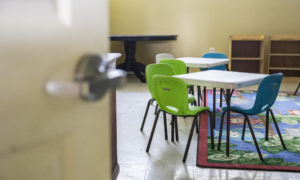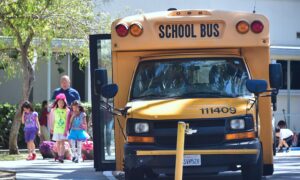Commentary
I can still remember seeing my mom organizing books in my elementary school library when I was in second grade. A few days a week, she would come in as a volunteer and shelve the hundreds of books kids checked out. She looked like she was having the time of her life.
It didn’t stop there—she also helped with book fairs, school assemblies, PTA fundraisers, and even attended a few school board meetings. My four siblings and I were blessed to have a mother who put aside so many other things to be intimately involved in our education.
I married into a family with a similar ethic. My mother-in-law finished her career as a school librarian and has always been ready with reading recommendations for my kids. Both she and my mom demonstrated that parental involvement in education is a cornerstone of student achievement, especially in public schools.
For parents who feel overwhelmed or under-qualified to assist at school, I invite you to look at the general provisions of the California Education Code. These sections emphasize the essential role parents play in their children’s education. Parents aren’t just caretakers—they are the primary educators, advocates, and enablers of their children’s future. No one has a deeper stake in their child’s development or a better understanding of how they learn than the parent. This role is irreplaceable.
From the moment a child is born, parents begin teaching—whether it’s how to walk, talk, or explore the world. That primary educator influence continues once a child enters formal schooling, where parents remain their strongest advocates. While teachers are deeply committed to their students, no one can replace the unique love and attention a parent provides. California law recognizes that schools perform best when parents are actively involved. Research confirms that sustained family involvement leads to better academic achievement and schools that truly support student learning.
Fortunately, there are many ways parents can get involved in their child’s education, no matter their work schedules or personal circumstances. Whether you’re a stay-at-home parent, a working professional, or a single parent, and even if you’re sharing custody, opportunities to engage are plentiful.
Starting each day on a positive note can set the tone for articulated learning. From ensuring your child gets enough sleep and providing nutritious meals to simply encouraging your child with kind words, your actions create a foundation for accomplishing academic goals.
Maintaining open communication with teachers and school staff is also critical. Don’t wait for parent-teacher conferences—check in regularly throughout the year. Ask about your child’s progress and offer your input. High quality schools value proactive parents who collaborate in their child’s academic journey.
If your schedule allows, consider volunteering in the classroom. By reading to students, assisting with art projects, or helping chaperone field trips, being present in your child’s learning environment shows your investment in their education and strengthens the parent–teacher partnership.
Helping a teacher with tasks like grading or filing papers is another great way to get in the classroom. It not only shows your commitment to your child’s education, but also gives you a peek into the classroom and the daily routine. Building relationships with teachers and other administrative staff, including the principal, can influence your child’s academic experience and outcome.
Joining the local parent-teacher association (PTA) or school site council offers a chance to influence decisions that affect the entire student body. These groups help shape school policies, programs, and improvements while also organizing school-wide events like book fairs, field trips, and school plays.
For parents whose children are involved in sports or extracurricular activities, coaching or assisting with teams, clubs, or musical productions is another way to participate. If coaching isn’t a feasible option, joining the booster club can help support athletic programs or arts initiatives, ensuring a well-rounded educational experience for all students.
Many parents juggle work, family, and other obligations, making frequent volunteering difficult. Thankfully, schools offer flexible options. Evening or weekend volunteer opportunities may be available, allowing you to contribute without disrupting your workday.
For parents who share custody, alternating involvement can ensure that both parents stay informed and engaged in school activities. Virtual options for parent-teacher meetings and PTA gatherings also make it easier to participate when time or distance is a challenge.
At the school district level, there are various oversight committees watching over finances, facilities, transportation, bonds, and curricula. These positions are usually appointed by the trustees and allow you to help shape district-wide policies, provide budgetary insights, and oversee the implementation of programs that directly affect your child’s education.
While teachers and schools play an essential educational role, the impact of engaged, supportive parents is critical in their child’s academic success. Active parents not only help their children thrive as students, but they also contribute to a stronger, more connected school community.
Parents: Get involved, stay informed, and be the best advocate your child will ever have. You are irreplaceable in education.













